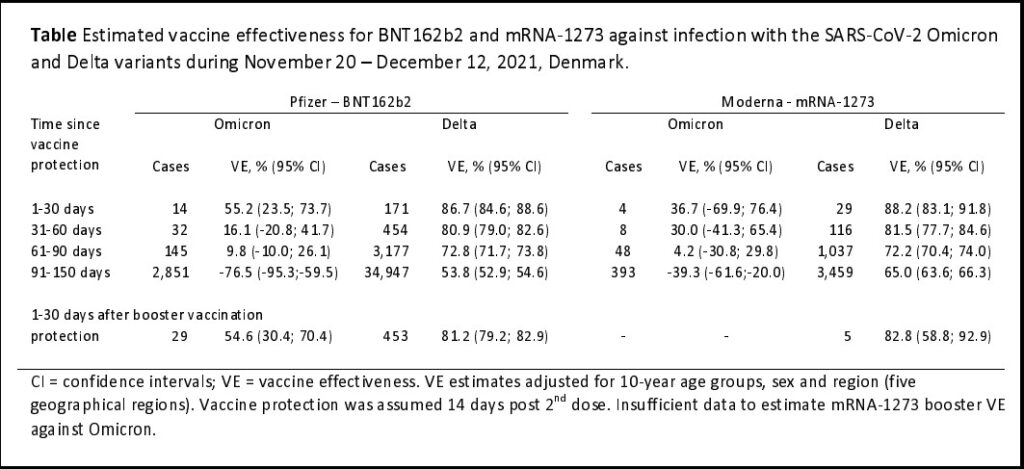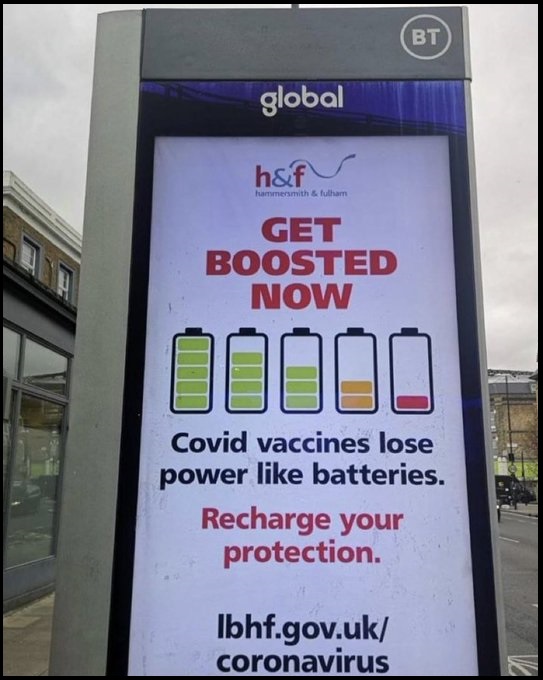Denmark Vaccination Effectiveness Study Shows Interesting Result, Deserves Much More Inquiry
CTH is just presenting data without too much interpretation on this study, because it could be analyzed two separate ways.
A Denmark study of vaccine effectiveness (VE) to “prevent infection“, and that’s a key point, shows both the Pfizer and Moderna vaccine benefits essentially disappear after 90 days to six months. [Study pdf Here] Now, some people are interpreting the bottom line result to say the vaccine makes you more susceptible to Omicron variant infection after the 150 day point [SEE HERE]. However, I’m not sure that’s the key takeaway.
The data does show that during the 91 to 150 day waning period of vaccine effectiveness, the vaccinated group who used Pfizer were 76.5% more likely to be infected with a variant versus the unvaccinated population. And the vaccinated group who used Moderna were 39.3% more likely to be infected with a variant versus the unvaccinated population. [Note, all natural immunity groups (previously infected) were removed from the study]

Yes, the study shows the vaccinated groups are more likely to be infected with Omicron than the unvaccinated population.
However, ¹if the Pfizer vaccinated group within the total population is at or near 76%, and ¹if the Moderna vaccinated group within the total population is at or near 39%, then what this Denmark study actually shows is a non-existent benefit from vaccination toward the Omicron variant. Not, and I repeat NOT, a finding that the vaccination itself makes you more prone to infection from Omicron.
What we need to know is how many people in the total population are vaccinated, AND what percentage of that total vaccinated population used Pfizer and Moderna.
If the total population Omicron infection rates for both Pfizer and Moderna groups mirror the vaccination rates for Pfizer and Moderna, then the vaccine effectiveness is nil for the prevention of Omicron infection. To me, that seems the most likely scenario.
The study conclusion is that booster shots are needed and provide essentially a 54.6% reduction in the risk of Omicron infection for Pfizer, and a (small sample) 82.8% reduction of the risk of Omicron infection for the Moderna group.
Obviously, more data is needed before this Denmark outcome can be accurately interpreted.
 People are rightly worried that the vaccination itself might make you dependent on the vaccine forever. Heck, there are people within the British government saying exactly that in their booster ad campaigns (see poster left).
People are rightly worried that the vaccination itself might make you dependent on the vaccine forever. Heck, there are people within the British government saying exactly that in their booster ad campaigns (see poster left).
Additionally, does the vaccine itself make you more prone to infection from a variant that defeats the vaccine-specific immunity response. That’s the basic issue within Antibody-Dependent Enhancement (ADE):
“In some cases, antibodies can enhance virus entry and replication in cells. This phenomenon is called antibody-dependent infection enhancement (ADE). ADE not only promotes the virus to be recognized by the target cell and enters the target cell, but also affects the signal transmission in the target cell.” (LINK)
Does the vaccine only target one version of the infection, and then allow other versions to avoid those vaccine antibodies, thus requiring ever continuing vaccinations that chase ever changing variants? So far, the answer appears to be yes.
That said, this issue of vaccine effectiveness against ‘infection‘ remains interesting and should be pursued. The reason is simple, if the vaccine does not prevent infection, then the premise of vaccine passports and/or vaccine mandates are moot.
Remove the ability of the vaccine to prevent infection, which seems brutally obvious at this point, and the only remaining benefit is one of medical outcome. Does the vaccine make you less likely to have a severe medical condition after you are infected?
When CTH originally started looking at hospitalization rates, what we found was that the percentage of the vaccinated population in the hospital requiring treatment was almost identical to the percentage of the surrounding overall population who were vaccinated. Ex. If the vaccination rate in the total population was 80%, the hospitalization rate for vaccinated individuals was essentially 80%. These reviews implied originally the vaccine was useless against severe outcomes requiring hospitalization.
All of the research essentially admits that both vaccinated and non-vaccinated people can be infected with COVID-19 and each variant of it. There is no vaccine value toward preventing infection. The issue is: does the vaccine immunity help you overcome the infection?
When you throw in the myriad of pre-existing conditions like obesity, diabetes and heart disease et al that make people more susceptible to any kind of respiratory infection, even without SARS-CoV-2 in the equation, then does all this vaccine chasing really amount to chasing severe cold and flu viruses with a vaccine regime?
The bottom line is that people need to make their own decisions based on their individual circumstances and everyone needs to respect those decisions. I doubt there is anyone choosing to make themselves more vulnerable with their vaccination decision.
Convincing an adult to do something is an endless quest, because it transfers outcome responsibility to the requester. The only dependency benefit in the convincing argument comes from the perspective of government. Politicians would like nothing more than for your outcome in life to be dependent on them. That’s also the scenario that abusers work diligently to construct.
When I see severe control demands and aspersions cast by who/what I define as an abuser, that flag tells me to exit.






Post a Comment